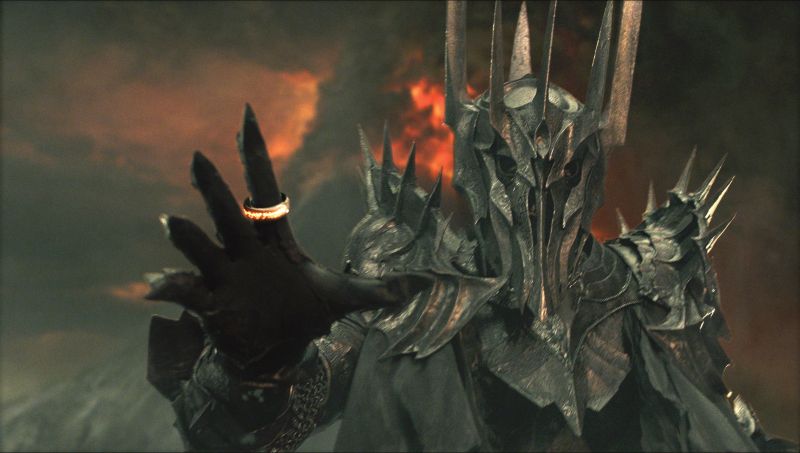 |
| "I will crush the Index!" |
JRR Tolkien, the Roman Catholic layman whose day job as a linguistics lecturer at Oxford was overshadowed by his brilliant books The Hobbit and The Lord of the Rings, was not sufficiently Catholic in his writings according to a few absurd traditionalists (here and here). Tolkien—who shouted Et cum spiritu tuo after the local bishops conferences translated the Roman Mass into vernacular—is apparently analogous to those teachers of false doctrine against whom St. Paul warns us in his first epistle to St. Timothy. Does anyone think Tolkien proffered a real pagan alternative to Christianity? Does anyone think the Fantasy genre (and Tolkien ought not be confined to it) is real? If Paul read and quoted pagan writers in the Scripture he wrote why can we not read the fiction of an entirely orthodox Catholic?
The Rad Trad suspects the dangers of emotionalism and brashness forewarned in these lectures are actually the Catholic spirit and religious instinct, not the preferred manual-based formal theology. Honestly, if a 5th century believer read Return of the King and Ludwig Ott's manual on dogma which would he find more Catholic in its totality, not just in what it says its outlook and how it speaks?
As an aside I met Tolkien's daughter Priscilla once in Oxford. She was leaving the Sheldonian with a friend of mine one night during Trinity term after a performance of Beethoven's Missa Solemnis. I greeted my friend, with no idea who the lady to his left was. He said, "Oh! [Rad Trad], this is Priscilla Tolkien!" We chatted for only a quick moment and my friend and I went on our way. My friend nearly died during the encounter. Why, you might ask? She is on the petite side and he could only think of hobbits....
What's worse is that if one tries to argue against the points made in the sermon/conferences here mentioned (or any other), the vitriol to which is subjected is suffocating. He's a priest; therefore, you cannot question him. Tell me again how so many Catholics fell (and continue to fall) away when they give priests more authority than they rightfully possess?
ReplyDeleteI'm with Maestro. Both have their place, and hitherto having been generally a fan of Audio Sancto, with some caveats, I am much more disinclined to listen to it. This series just casts a very long shadow over anything good and needful they have preached over the years.
Alright, so I overreacted (my be that religious zeal with which I defend these pagan books). Still my point was that some dislike good books because they do not reflect the imagined party line and that still stands.
DeleteAnd I agree, some priests need to get off the high horse and stop acting like they speak for the Church in all their opinions. Many—liberal, neo-con, and trad—drive people from faith when they do such things.
I don't agree with this critique of the Tolkien. It's basically targeting the movies and actors.
ReplyDeleteI think two major weaknesses of the "critique" is that (1) it fails to reckon with the meta-"context" (don't really know the appropriate term here) of the Silmarillion as how the Elves viewed their origins and history, and (2) it failed to take into account the tales of how Men saw themselves: the debate of Finrod and Andreth, and to a somewhat lesser extent, the tale of Adanel.
ReplyDeleteI have always enjoyed Tolkien's works and have always viewed them as entirely Catholic. I have strongly defended Pearce's thesis of myth and Tolkien's work as a fabulous method for conveying transcendental truths. I think LOTR is an outstanding story. After reading the entire transcript on Rorate and thinking about it and talking with friends about it, I have serious doubts about whether Tolkien's really is the Catholic masterpiece that many say it is. The priest makes very good points that are not easily refuted. I have found that virtually everyone who bashes the article has not read it- not that it matters because most people already seem to their minds made up about it anyway . . .
ReplyDeleteI have read some of the conference transcripts and listened to some of the sermons. In short the priest is attacking a straw man. LOTR is not myth or fantasy, it's fiction meant to encapsulate a linguistic and literary experiment germane to the author's field of study. It has some Catholic tones to it, as do many authors' books, but it is not a "fable" or "myth" offering a world view to compete with the Catholic one. The priest is equating LOTR and Tolkien with youth decadence and attaching the author and his work. If we are to attack everything that is not intentionally, explicitly, and thoroughly 100% Catholic doctrine why not attack a toaster or a three piece suit?
Delete